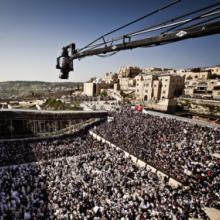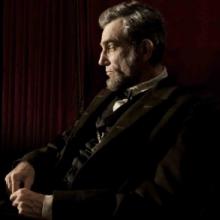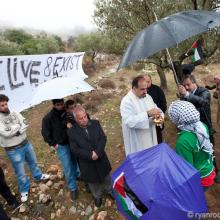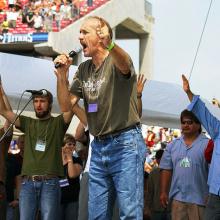Jews
A new Pew Research survey finds U.S. adults feel most warmly about people who share their religion or those they know as family, friends or co-workers.
Americans give their highest scores to Jews, Catholics, and Evangelicals on a zero-to-100 “thermometer” featured in the survey, “How Americans Feel about Religious Groups,” released Wednesday. They’re nestled within a few degrees of each other: Jews, 63; Catholics, 62; evangelicals, 61.
In the middle of the chart: Buddhists, 53; Hindus, 50; Mormons, 48. Trending to the chilly negative zone: atheists at 41 and Muslims at 40.
Pew took the thermal reading because “understanding the question of how religious groups view each other is valuable in a country where religion plays an important role in public life,” said Greg Smith, Pew’s associate director of religion research.
Secretary of State John Kerry brought his argument for a two-state Israeli-Palestinian peace to the annual AIPAC conference this week, and whatever else we might know, we know this: Many evangelical Christians didn’t like it.
Or at least that’s what we’re told by some Christian leaders and their political allies. Supporting Israel’s government by opposing compromise with the Palestinians is a permanent plank in American evangelical political thought. “God told Abraham that he would bless those who bless him and the nation of Israel,” the thinking goes, “and curse those that curse Israel.”
But could it be that the truth is more complicated?
What if the loudest evangelical voices don’t represent the complexity of our community? I raise these questions as an evangelical who is fully committed to supporting the struggle for security, dignity, and freedom for Israelis and Palestinians. And I’m not alone.
It may be as close as a person can get to praying at the Church of the Holy Sepulchre, the Al-Aqsa Mosque and the Western Wall, without actually going there.
The newly released movie “Jerusalem,” filmed in 2D and 3D and playing on IMAX and other giant-screen theaters across the U.S. and the world, gives viewers grand, hallmark panoramas, at once awe-inspiring and intimate.
For years filmmakers had sought the rights to capture the city from the air, but never before had permission been granted, in part because the holy city is a no-fly zone.
Still, before filming began in 2010, producer Taran Davies came up with an extensive wish list of all the sites and rituals he wanted in the film, and presented it to advisers familiar with the spectrum of religious and secular officials who would have to approve.
“They all laughed and said forget about it,” Davies said. “They said, ‘It’s impossible and you’re not going to get half of what you’re looking for.’”
At an emotional worship service, considered one of the largest gatherings of Christians and Jews, some 1,600 British men and women filed into Westminster Abbey Sunday to mark the 75th anniversary of Kristallnacht.
Also known as the Night of Broken Glass, Kristallnacht was a series of coordinated attacks carried out by Nazi paramilitaries and civilians against Jews throughout Hitler’s Germany and parts of Austria between Nov. 9 and 10, 1938.
More than 90 German Jews were killed and 30,000 more sent to concentration camps.
During the hourlong service, a candelabra from the Belsize Square Synagogue in central London was processed through the abbey where England’s kings and queens are buried.
They’re rarely at worship services and indifferent to doctrine. And they’re surprisingly fuzzy on Jesus.
These are the Jewish Americans sketched in a new Pew Research Center survey, 62 percent of whom said Jewishness is largely about culture or ancestry and just 15 percent who said it’s about religious belief.
But it’s not just Jews. It’s a phenomenon among U.S. Christians, too.
Meet the “Nominals” — people who claim a religious identity but may live it in name only.
Conversations in Transition is a veritable graduate course in what South Africans call ubuntu, or good neighborliness.
Charles Villa-Vicencio and Mills Soko present 23 narratives of both well-known and unsung heroes of the anti-apartheid struggle. These narratives are filled with instructive words of wisdom for seekers of peace with justice in countries emerging from post-tyranny chaos and in long-established democracies alike. Historians and activists will find hope in the stories of South Africa’s courageous, diverse citizens, as well as prophetic insights and warnings as the subjects address post-apartheid violence and oppression in a country still on the edge.
My own experiences lead me to an unqualified endorsement of this invaluable compendium. Over several decades I have pondered repeatedly two particular conversations, one with a Jew in Israel and the other with a Muslim from Cape Town.
An effort was made to introduce the Truth and Reconciliation Commission (TRC) process into the Israel-Palestine conflict. At the end of an evening with South African officials and members of the Israeli and Palestinian communities, the director of a Jewish study center in West Jerusalem, Benjamin Pogrund, shared a revealing comment. He said, “TRC will never work here because Israelis do not have the theological and philosophical understanding of forgiveness and reconciliation that Muslims, Christians, and Jews shared in South Africa in order to bring unity and liberation without major conflict.”
WHEN I WAS growing up in the western suburbs of Chicago, I felt so far outside of the inner circle of cool kids that I didn’t even know where the circle was. So you can imagine my delight when I got an invitation to David’s birthday party. David was in the outer part of the inner circle, which meant I was heading in the right direction.
A couple days before the party, my mom took a closer look at the invitation and noticed that it said David’s parents would be making hot dogs for lunch. As she wasn’t sure whether the hot dogs were pork or beef, and as we were Muslims who don’t eat pork, she informed me that she’d be giving me all-beef franks to take from home with a note to David’s mom asking her to fry them up in a separate pan.
Of course, this horrified me, the kind of horror that only a kid caught up in the jungle of grade school coolness competition can feel. I remember standing in the living room, staring at my mom, and thinking to myself: “First, you named me Eboo.”
The day of the party rolled around and, dutiful Indian-Muslim child that I was, I accepted the little plastic baggie with two beef hot dogs that my mom handed me, allowed her to put me in nice slacks and a collared shirt, and went off to the party. When lunchtime came, I snuck into the kitchen to make my request of David’s parents. Imagine my surprise when I noticed another kid in the kitchen. He wore a collared shirt and nice slacks and also held a plastic baggie with two hot dogs.
Gay Americans are much less religious than the general U.S. population, and about 3-in-10 of them say they have felt unwelcome in a house of worship, a new study shows.
The Pew Research Center’s study, released Thursday, details how gay, lesbian, bisexual, and transgender Americans view many of the country’s prominent faiths: in a word, unfriendly.
The vast majority said Islam (84 percent); the Mormon church (83 percent); the Roman Catholic Church (79 percent); and evangelical churches (73 percent) were unfriendly. Jews and nonevangelical Protestants drew a more mixed reaction, with more than 40 percent considering them either unfriendly or neutral about gays and lesbians.

(Yobidaba / Shutterstock)
BECAUSE I'M A Jew in Bethlehem, Pa., also known as “Christmas City USA,” I spend December celebrating Jesus’ birth. Representations of other religions are largely absent, but with evergreen trees adorning lampposts, the nativity scene at city hall, and 6-foot-high electric Advent candles, Christmas here is both beautiful and unavoidable.
Given Christianity’s dominance in the United States, similar examples extend into other seasons and across the country. Christian holidays and Sunday receive scheduling deference, Christian worship options are varied and plentiful, and debates over public “religion” focus almost entirely on Christianity. In contrast, Jews use vacation days to observe holidays, Jewish religious communities are far fewer, and there is no movement advocating Jewish prayer in schools.
Even in interreligious settings intended to be neutral, Christianity retains primacy. Exchanges emphasize concepts in Christianity, such as belief and faith, and downplay the Jewish stress on action, behavior, and ritual. When interfaith interactions turn to biblical texts, they rely on Christian hermeneutical approaches such as using English translations without acknowledgment of their underlying Hebrew and eschewing the Jewish practice of viewing the Bible through subsequent commentaries. To me, these verses look discomfortingly naked when not swaddled with sages’ centuries-old wisdom, and Christian translations often conflict with how I understand the original language.
NEW YORK — I sat with my gospel choir colleagues, in a pew, while the host choir at Park Avenue Synagogue rehearsed a lovely Psalm setting in Hebrew.
Some sang the Hebrew text with ease, some with difficulty — a reminder that faith generally means learning a language other than one’s own.
After the synagogue choir sang in their other-language, we joined them to sing in our other-language: swaying to the beat, getting one’s body into the praise. They responded gladly, as our combined choirs rehearsed Richard Smallwood’s epic “Total Praise,” a setting of Psalm 121, which Christians and Jews share.
When two choirs from Park Avenue Christian Church and two choirs from Park Avenue Synagogue, plus some jazz musicians, performed Sunday, at a Psalms festival, we disrupted 2,000 years of animus between Christians and Jews. In the eyes of the creator God who made us all, we said, we are more alike than different, more connected than separated, more eager for shared faith than for separate and superior faith.
WASHINGTON — The adult survivors of the Holocaust are mostly gone now, and those who survived as children — and were old enough at the time to remember their ordeals — are now in their 70s and 80s.
It won’t be long before no eyewitnesses remain.
That’s why, as the U.S. Holocaust Memorial Museum marks its 20th anniversary today (April 29) with more than 750 survivors, museum officials are calling it one the last large gatherings of those who managed to escape Hitler’s death machine.
For those who have dedicated themselves to teaching future generations about the Holocaust and its victims, the demise of the survivors means looking backward in a different way — a way that no longer includes people looking others straight in the face and recounting what they saw and what they lived.
JERUSALEM — Women who want to wear prayer shawls while praying in the women’s section of the Western Wall are not breaking the law, according to a landmark decision handed down Thursday by the Jerusalem District Court.
Israeli police arrested five women on April 11 who were dressed in prayer shawls while praying with Women of the Wall, an activist group that prays at Judaism’s most sacred site once a month.
Immediately following those arrests, a lower court judge ruled that the women had not violated “local custom,” a legal concept intended to keep the fragile peace at holy sites. The Western Wall is a remnant of the Second Temple that was destroyed nearly 2,000 years ago.
Jews worldwide welcomed newly elected Pope Francis as a friend on Wednesday, and pointed in particular to his sympathetic and strong reaction to the 1994 bombing of a Jewish center in his native Argentina — the deadliest bombing in the country’s history.
As Cardinal Jorge Mario Bergoglio, the archbishop of Buenos Aires, Francis “has had a warm relationship with the Jewish community of Argentina, and enjoyed close friendships with many prominent rabbis,” said Rabbi David Rosen, international director of interreligious affairs at the American Jewish Committee. “As far as I have heard and read in the few minutes since he was elected pope, he has shown deep signs of respect and friendship towards the Jews,” said Riccardo Di Segni, the chief rabbi of Rome. “It’s a good starting point.”
Steven Spielberg’s Lincoln will probably nab a few of its 12 nominated Academy Awards when the Oscars are handed out on Sunday — a sign that Americans never have and probably never will tire of our 16th president.
Abraham Lincoln’s face is etched in stone on Mount Rushmore and his brooding statue sits enshrined in a Greek-style temple in Washington. His succinct Gettysburg Address (about 270 words) took all of about two minutes to deliver, yet remains this nation’s most famous speech 150 years later. His assassination lifted him to mythic status — a martyr who earned his place in our pantheon of national heroes.
We just marked the 150th anniversary of his Emancipation Proclamation, but that necessary action wasn’t enough. Spielberg’s film revives Lincoln’s second act, in 1865, to pass the Thirteenth Amendment to abolish slavery through a divided Congress. It wasn’t the only injustice Lincoln worked to correct.
In his recent book, When General Grant Expelled the Jews, Brandeis University Professor Jonathan D. Sarna recounts an important but little-known event in 1863 in Lincoln’s quest for full civil, religious, and human rights for all Americans — this time, for American Jews.
Hebron is known as one of the most volatile cities in the whole region of Israel/Palestine. Located in the heart of the West Bank, both Jews and Arabs have had roots here for thousands of years. Having endured years of conflict, racism, violence and separation, Hebron’s inhabitants have been covered in a narrative lacking an acknowledgment of a shared humanity.
It’s in the middle of such realities that our Learning Community (part of our organization, The Global Immersion Project) feels called to listen, learn, and be radically present. Through the art of friendship making, shared tables and storytelling, we desire to promote the just heart of God by being a people of reconciliation in the way of Jesus.
It was this posture that landed us in the underground home of a local Muslim Palestinian family who is close friends with the Jewish Rabbi who was hosting us in the old city of Hebron (he is both a host and dear friend). Having prepared a beautiful and expansive Palestinian meal, they warmly invited each one of us into their home and said, “Today, this is your home.”
Seven years after Hurricane Katrina toppled a nearby floodwall and drowned their synagogue, and after a seven-year journey praying in hotel meeting rooms, then in rooms borrowed and rented from another congregation, the 100 or so families of Congregation Beth Israel are finally home.
The wandering congregation moved into their new synagogue in suburban Metairie on Aug. 26, three days before the Katrina anniversary and two days before Hurricane Isaac hit landfall in Louisiana.
With a short parade that included a New Orleans brass band, clergy and friends ceremonially carried their five sacred Torahs to their home in Beth Israel’s new ark.
There’s a passage from Hebrew Scripture from the Song of Solomon carved into the ark’s face: “Mighty waters cannot extinguish our love.”
The news that Israel’s memorial to Holocaust victims had been grafittied in early June with bitterly anti-Semitic and anti-Israel statements was shocking.
More shocking still was the news that the three men arrested for the crime are Jewish.
How could Jews desecrate the memories of millions of fellow Jews who perished at the hands of the Nazis?
The religious identities of the culprits -- however surprising to many who read of their arrests last Tuesday (June 26) -- did not surprise many Israelis, however. They know that a number of ultra-Orthodox Jews, for religious reasons, believe the State of Israel should not yet exist.
WASHINGTON--Ever since their mad dash out of Egypt bound for the Promised Land, Jews have been on the move -- and they continue to be, far more than any other religious group, according to a new study.
One in four of the world's Jews has migrated from one country to another, compared to 5 percent of Christians and 4 percent of Muslims who have left their native lands.
The findings are part of a comprehensive new study on religion and global migration, released Thursday (March 8) by the Pew Forum on Religion & Public Life, which tracked the journeys of the world's 214 million migrants.
"The world Jewish community is consolidating," said Jonathan Sarna, a professor of American Jewish history at Brandeis University who did not work on the study. "Jews are abandoning Third World countries where historically they had been persecuted and moving to large and generally free First World countries."
No other major religious group approached the 25 percent migration rate of the Jews, said Phillip Connor, the senior researcher on the study. On average, he said, only 3 percent of the world's population migrates.
What one quickly learns when visiting Bethlehem is that the political climate today is quite similar to the one that was prevailing during the time of Jesus. One exception is that the Palestinian inhabitants of Bethlehem today are being occupied by those who consider themselves the offspring or cultural descendants of Jews who were under the yoke of Roman occupation in the first century. Other reminders of the political similarities are the weekly demonstrations on the outskirts of Bethlehem by Palestinians, Israelis, and internationals to nonviolently protest the confiscation of Palestinian land to build new Jewish settlements. Unarmed and nonviolent demonstrators face heavily equipped Israeli troops who protect those who steal Palestinian lands in the West Bank and construct segregated settlements on them. This reminds us of the brutality of the Roman occupation forces against Jewish freedom fighters.
But Bethlehem today is not all consumed with politics. Many of the folks in Bethlehem could not care less about politics. Repeated disappointments with the host of so-called peace brokers and failed peace plans have caused many Bethlehemites to abandon politics. They just want a decent standard of living to carry on with life in security with their children and grandchildren. These are the people who in spite of the same closures and repression by the forces of occupation, choose to be peaceful. They hope that freedom will come but they don't know when or how it will come. Like the folks who lived when Jesus was born, they continue to wait quietly for political liberation.
Though I treasure my Pentecostal heritage, these days I feel like an outsider looking in, because though it started out as a pacifist movement in the early 20th century, today Pentecostalism (at least in America) is largely known as a religion that spawns extremist movements that trumpet militarism and bigotry.
Chief exhibit: The Call
Founded by Lou Engle, The Call is a movement that regularly holds massive prayer events in stadiums across the country. Engle is part of a network called the New Apostolic Reformation, which believes that God is raising up an end-times army of apostles and prophets to take over earthly governments before Jesus comes back.
A few of its prominent leaders are Peter Wagner, Cindy Jacobs, Rick Joyner, and Mike Bickle. Though the end-times theology of these individuals may vary, the underlying principle that binds them together is the idea that Christians are called to dominate earthly governments and civil society, and that apostles and prophets are supposed to pave the way to make that happen.


















